“Cat meows” are the primary form of communication used by domestic cats and contain a complex language all its own. Cat vocalizations, or the meowing of a cat, are a fascinating subject of study, reflecting a wide array of emotions, needs, and desires that cats use to interact with humans and other animals.
Cats meow to seek human attention and interaction as a greeting. For example, if your cat is hungry, she has a special meow to tell you that she wants food, and we all know how that sounds! And when a cat is in distress, discomfort, or pain, she will make a different-sounding meow.
There are many different kinds of cat meows that express those different meanings, including purring to express pleasure and comfort, growling as a warning to back off, yowling to indicate distress, and a chirp or trill that you generally hear when your cat is watching the birds in your garden.
Some cats have a frustrating habit of excessive meowing, just like some people talk too much, and that’s a feline personality quirk you must learn to love.
Read this guide to learn more about why your cat meows and exactly what she’s trying to tell you.
Why Do Cats Meow?
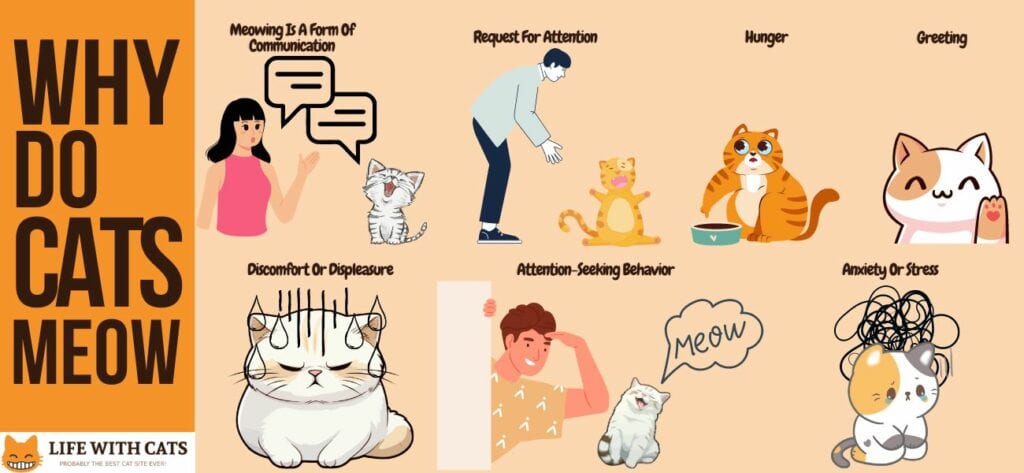
Cats meow because that’s their primary means of communication, especially with their human owners, as a greeting and to encourage interaction.
Every cat owner is familiar with their cat’s meow when she’s hungry and demanding food, and if your cat is hurt or distressed, she makes a different kind of meow.
Here are some common reasons behind cat meows, some of which might surprise you!
Meowing Is A Form Of Communication
In addition to her body language, your cat uses meowing to communicate with you and, to a lesser extent, with other cats and pets.
Your cat uses different types of meows to express different feelings and emotions, including anger, affection, pain, and as a greeting.
Request For Attention
Often, a cat will meow purely to get her owner’s attention. Sometimes your cat meows because she wants to be petted or she’s bored and in the mood for a game.
Hunger
Every cat owner is undoubtedly familiar with her cat’s meow when she’s hungry and wants to be fed!
So, if your cat is hungry, she will meow at you, usually while she’s hanging around her food bowl, making it obvious she wants something to eat.
Greeting
Some cats, including my own, routinely meow to greet me when they come in after a night out and can even sometimes meow at our dog purely as a greeting.
Discomfort Or Displeasure
If the cat growls or makes a particular sound meow, that can indicate displeasure, or it could mean that your cat is in discomfort. So, I recommend taking your cat to the vet if she starts making that sound frequently and for no apparent reason.
Anxiety Or Stress
Cats often meow more when stressed or anxious about something, especially when in unfamiliar surroundings or during significant changes in their usual routine.
For example, when I moved home recently, both my cats spent many hours wandering around their new place, meowing to express their confusion.
Attention-Seeking Behavior
Some cats are much more vocal than others and meow purely to get their owner’s attention, regardless of their immediate needs.
That can be incredibly annoying if the cat meows excessively during the night when you’re trying to sleep, and we will discuss what action you can take to correct excessive meowing later in this article.
What Are The Different Types Of Cat Meows?
The different cat meows are used to express how your cat is feeling or what she wants, and it’s important you learn how to speak fluent “feline” to ensure a harmonious relationship with your furry friend.
Meow
The regular meow that all cats make is typically a form of greeting or a request for attention. My cats usually meow at me when they’re outside and see me arriving home, which is rather cute.
Purr
Most cat owners are familiar with their furry friend purring during a petting session or sometimes when the cat eats a particularly tasty meal. Purring is usually a sign that your cat is relaxed and content, although cats sometimes also purr as a self-soothing mechanism when distressed or in pain.
Hiss
Your cat will hiss as a form of defense when she feels agitated or threatened.
For example, my cats regularly hiss at my puppy when he gets too close to them for comfort; although he would never hurt them, he simply wants to play.
Growl
Growling is similar to hissing and is a form of defense that cats use when they feel uncomfortable, agitated, or threatened.
Chirp Or Chatter
Cats often produce chattering or chirping noises when they can see birds or other inaccessible prey outside the window.
For example, my cats often sit on the windowsill chirping at the sparrows feeding and squabbling outside in the garden, apparently because my feline friends are frustrated that they can’t get to the birds and excited because their prey is just out of reach.
Trill
Trilling is typically an inviting, friendly meow that mother cats use to communicate with their kittens.
Yowl
Yowling is a familiar sound that is often heard late at night and can indicate distress, territorial disputes, and mating behavior when the local Tom cats are patrolling your neighborhood.
Caterwaul
Tom cats are usually responsible for the long, wailing caterwauling meows that wake you up during the wee small hours. Basically, that’s the sound made by unneutered cats looking for a mate.
Screaming
Screaming is a high-pitched, intense meow that you only hear when your cat is in extreme distress or pain, so that’s a sound you never want to hear.
Mew
A mew is a sound similar to a cat’s meow, but it’s typically quieter and more subdued and is used to express emotions from affection to attention-seeking.
Why Do Cats Meow Excessively?
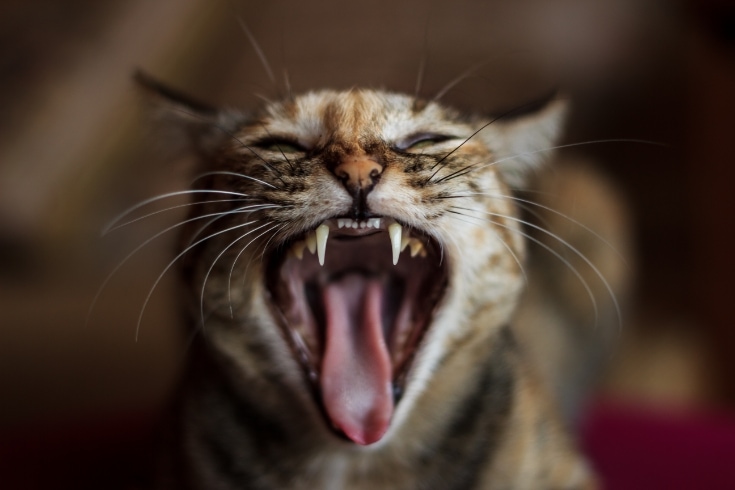
Cats meow excessively because they’re hungry, bored, seeking attention, or anxious about something going on in their environment. Your cat might also meow continually if she has an underlying medical issue, such as feline cognitive dysfunction or joint pain.
Some cat breeds, such as Siamese and Maine Coons, have a bad rep for meowing excessively, although a backstreet moggy can be equally as vocal as a top-draw pedigree pussycat. It really just depends on the individual cat’s personality.
Excessive meowing can be annoying, but before you can start training your cat to modify her undesirable vocal behavior, you must understand its root cause.
How To Stop Excessive Meowing
Sometimes, it is possible to stop your cat from meowing excessively, depending on what’s making her so vocal.
First of all, you need to have your cat checked over by a vet to ensure she has no underlying medical conditions.
Once you know that there’s nothing physical amiss with your feline friend, check she has everything she needs in an enriched environment and is settled into a regular routine. Consider providing your pet with a friend to combat loneliness or use pheromone calming products to reduce stress.
If all else fails, you might seek the advice of an animal behaviorist who could give you some training exercises to work on with your cat, which might help modify your pet’s behavior.
Rule Out Medical Issues
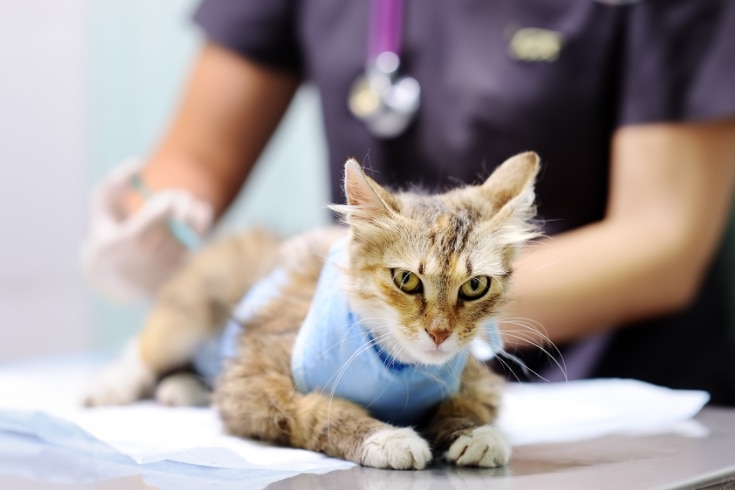
Your first action should be to discuss your cat’s excessive meowing with your vet to see if there is a medical cause for it.
I once had an old cat that started yowling at night loud enough to wake the dead! Her behavior was out of character, so I sought veterinary advice. It turned out that my cat was in the early stages of feline cognitive dysfunction, or cat dementia. My cat was prescribed drug therapy, and the problem disappeared.
Ensure Basic Needs Are Met
If your cat is always hungry or thirsty, she will likely keep meowing in the hope that you’ll feed her. Similarly, a housecat needs a clean litter box to use, and if you neglect to clean the box, your furry friend might vocalize her objection.
Provide Environmental Enrichment
Boredom and the stress it causes can also cause a cat to meow excessively, so ensure your pet has plenty of toys, scratching posts, and interactive training or play sessions with you to alleviate that.
Establish A Routine
Cats do best when they have a routine, so try to establish a regular schedule of feeding, playtime, rest, and training sessions for your cat.
For example, one of my cats arrives home after a night out with his feline friends and meows constantly outside my bedroom window at 6 am until I let him in for his breakfast. If I ignore my pet’s plaintive cries, he will continue meowing louder and louder until I get up and let him in.
Ignore Attention-Seeking Meows
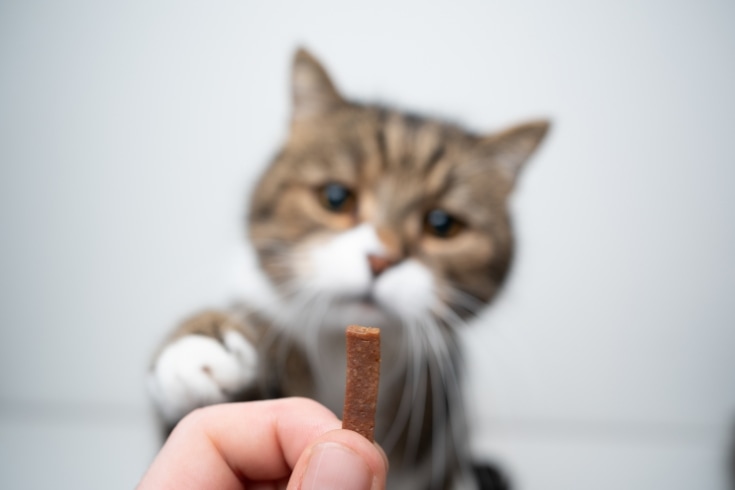
You can sometimes cure excessive attention-seeking meowing by ignoring the behavior and using positive reinforcement by rewarding your cat when she is quiet. That way, your kitty learns that screaming at you gets her nothing, whereas staying politely quiet earns her a tasty treat or a head rub.
Provide Companionship
Some cats meow excessively because they are lonely and bored, especially if you’re out at work for much of the day, leaving your cat home alone.
So spending more quality time with your pet during interactive playtime or fun training sessions can help. Alternatively, you could get your lonely kitty a companion. However, remember that cats are territorial creatures, and your pet might not appreciate an interloper on her patch.
Reduce Stressors
Cats will often become vocal when stressed, so if something in your pet’s environment makes her anxious, you should consider removing it if possible.
However, if your cat hates your new boyfriend or puppy, removing that stressor might not be desirable or practical! In that case, you should set aside an area of your home for your cat where she can find peace and comfort until she gets used to the new arrival and will mix freely with them.
Consider Pheromone Products
If your cat’s excessive meowing is stress-related, using a pheromone spray on her bedding or a plug-in in her favorite room can sometimes help to calm your pet and reduce her vocal outbursts.
Seek Professional Advice
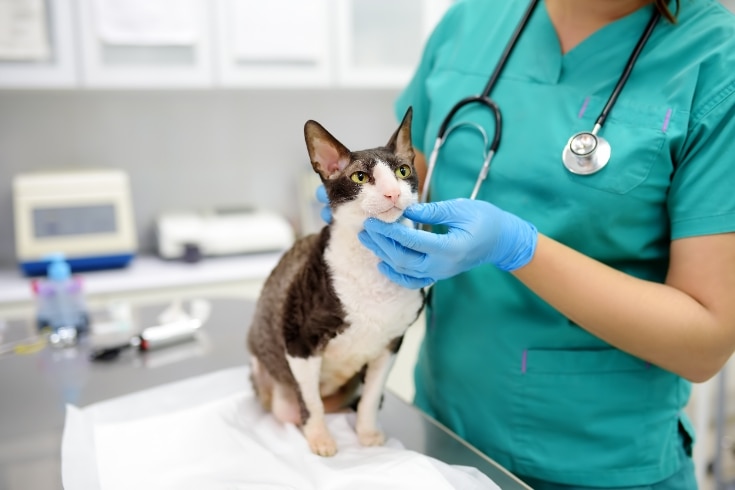
If your cat’s excessive meowing persists, we recommend that you seek veterinary advice to rule out a medical reason for your cat’s behavior. Once your pet has been given the all-clear, you could refer to a professional animal behaviorist for guidance.
Do Cat Meows Change With Age?
As cats age, their vocalization sometimes changes for various reasons, including age-related cognitive conditions and other health conditions.
Kitten Meows
Kittens meow primarily to communicate with their Mom, for example, to check that she’s around when they want food and sometimes for play. When you get a kitten, you’ll probably find that your new pet “talks” to you in much the same and for the same reasons.
Adult Cat Meows
Adult cats tend to talk to humans rather than to each other, and not all cat meows sound the same. For example, when your adult cat wants something, meow will be mid-length in duration and mid-pitched in tone.
Senior Cat Meows
If a senior cat is suffering from cognitive dysfunction or feline dementia, she may start to caterwaul, especially at night. In addition, since older cats can have hearing loss, your senior kitty might turn up the volume and wander aimlessly around the house, becoming increasingly frustrated and caterwauling even more.
What Are Some Frequently Asked Questions About The Meaning Of Cat Meows?
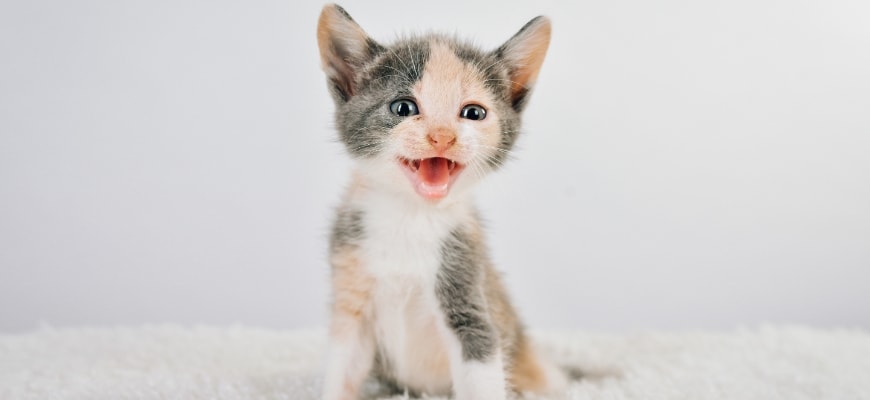
Here are the answers to some of the most frequently asked questions about the meaning of cat meows to add to the information we’ve already provided above.
Can The Meaning Of A Meow Vary Between Cats?
Yes, rather like people, cats have individual personalities and varying communication styles, so the tone and meaning of meowing can vary quite dramatically from one cat to another.
How Can I Tell If My Cat’s Meow Is A Sign Of Hunger?
If your cat meows repetitively and insistently, especially in the kitchen, while you’re eating, or near her food bowl, it’s a pretty safe bet that she’s hungry.
What Does It Mean When My Cat Meows With A Different Tone Than Usual?
A change in the tone of your cat’s meow can sometimes indicate an alteration in your cat’s emotional state or a potential underlying health problem. Keep an eye on your cat’s behavior and consider having your vet check her over if the strange meowing persists.
Is There A Specific Meow My Cat Uses To Communicate With Other Cats?
Although cats mostly use their body language and Center marking to communicate with other cats, they do sometimes use specific meows when interacting with each other.
For example, when a male unneutered cat is looking for female company, he will yowl or caterwaul loudly to attract a mate. Compare that with the subdued meow your cat offers you when you come home from work!
Can A Cat’s Meow Change As They Grow Older?
Yes, as your cat ages, she might experience changes in vocalization because of various factors, including health conditions and age-related cognitive changes.
In general, a kitten’s voice is much higher pitched and squeaky than that of a full-grown adult cat.
Conclusion
Understanding what your kitty cat is trying to say to you when she meows is critical to your relationship with your furry feline friend.
In addition to her body language, your cat’s meow is her main form of communication with you and is her way of expressing herself and grabbing your attention.
Your pet has many different meows that all say different things, including purring to tell you that she’s content and relaxed, growling at other cats to warn them to back away, and chirping or trilling when watching the birds flitting around the trees outside your window.
Some cats meow excessively if they are lonely, stressed, hungry, excited, or searching for a mate.
I hope you enjoyed this article and are now well on the way to speaking in fluent “felinese” with your pampered pet!